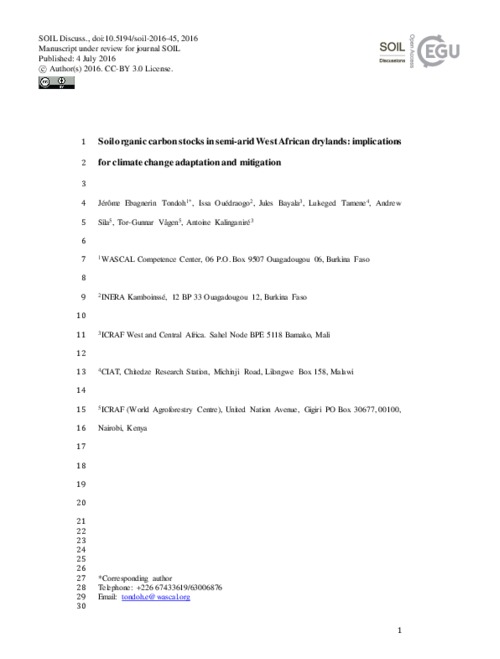Resource information
In the West African drylands, SOC sequestration is seen as one of the prominent strategies to both enhance the resilience of agro-ecosystems and mitigate global greenhouse effects. However, there is a dearth of baseline data that impede the design of site-appropriate recommended management practices (RMPs) to improve and sustain SOC accrual. In this study, the Land Degradation Surveillance Framework (LDSF), a nested hierarchical sampling design was used to assess SOC and its spatial variability across the semi-arid zones of Ghana (Lambussie), Burkina Faso (Bondigui) and Mali (Finkolo). Soil samples were collected from three sites of 100 km2 stratified into 16 clusters and 160 plots and thereafter soil parameters were then analyzed using MIR spectroscopy. Regardless of soil strata, SOC storage with 95 % confidence level in semi-arid landscapes potentially ranged between 112 200 ± 14 000 and 253 000 ± 34 000 Mg C corresponding to 411 400 ± 51 333 Mg CO2-eq and 927 666.7 ± 124 666.7 Mg CO2-eq in the entire study area. On the other hand, investigation on the potential of climate change mitigation through SOC revealed contrasted figures as accumulation rates in cultivated lands ranged from 0.04 to 0.18 MgC ha−1 yr−1 and are balanced by higher depletion rates of −0.004 to −0.73 Mg ha−1 yr−1. This indicates the potential of semi-arid soils to store carbon through improved land management practices. Landscape study structured in cluster-level analysis revealed heterogeneity in the distribution of SOC stocks, a mandatory finer level analysis prior to effective decision-making about RMPs.



